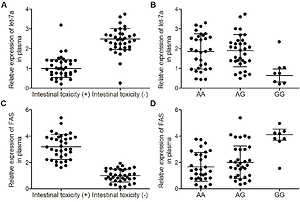Current issue
Archive
Manuscripts accepted
About the Journal
Editorial office
Editorial board
Section Editors
Abstracting and indexing
Subscription
Contact
Ethical standards and procedures
Most read articles
Instructions for authors
Article Processing Charge (APC)
Regulations of paying article processing charge (APC)
UROLOGY / CLINICAL RESEARCH
Effect of genetic variants in FAS and let-7a on radiation-induced intestinal toxicity in the treatment of prostate cancer
1
Department of Medical Imaging, The First Affiliated Hospital of Kunming Medical University, Kunming, Yunnan Province, China
2
Intensive Care Unit, The First Affiliated Hospital of Kunming Medical University, Kunming, Yunnan Province, China
3
Department of Radiology, The First Affiliated Hospital of Yunnan University of Traditional Chinese Medicine, Kunming, Yunnan Province, China
Submission date: 2019-04-26
Final revision date: 2020-03-09
Acceptance date: 2020-03-22
Online publication date: 2021-04-05
Corresponding author
Ling He
Radiology Department, The First Affiliated Hospital of Yunnan University of Traditional Chinese Medicine, Kunming, Yunnan Province 650021, China
Radiology Department, The First Affiliated Hospital of Yunnan University of Traditional Chinese Medicine, Kunming, Yunnan Province 650021, China
KEYWORDS
TOPICS
ABSTRACT
Introduction:
The present study aimed to explore the effects of pri-let-7a-1 rs10739971 and FAS-670 rs1800682 polymorphisms on the pathogenesis of radiation-induced intestinal toxicity in prostate cancer (PC) patients.
Material and methods:
Three hundred eighty PC patients with or without signs of intestinal toxicity were enrolled in a study on the effects of let-7a rs10739971 and FAS-670 rs1800682 polymorphisms on rectal volume and the risk of intestinal toxicity. In addition, real-time PCR, Western blot analysis, immunohistochemistry (IHC), luciferase assays and computational analyses were performed to explore the mechanism underlying the role of let-7a rs10739971 polymorphism in radiation-induced intestinal toxicity.
Results:
The let-7a rs10739971 polymorphism but not the FAS-670 rs1800682 polymorphism was closely associated with the risk of radiation-induced intestinal toxicity featured by a high rectal volume. In addition, there was no significant association between the rectal volume and the genotype and allele frequencies of FAS -670 rs1800682 and Pri-let-7a-1 rs10739971 polymorphisms. The GG genotype of let-7a rs10739971 polymorphism reduced let-7a expression but enhanced FAS expression. In addition, the intestinal toxicity (–) group showed a much higher level of let-7a and a much lower level of FAS than the intestinal toxicity (+) group. FAS was a virtual target gene of let-7a, which decreased FAS protein expression in a dose-dependent manner.
Conclusions:
The GG genotype of pri-let-7a-1 rs10739971 polymorphism could increase the risk of radiation-induced intestinal toxicity in PC patients. Therefore, the pri-let-7a-1 rs10739971 polymorphism could be used as a putative marker to predict the risk of intestinal toxicity in PC patients undergoing radiotherapy.
The present study aimed to explore the effects of pri-let-7a-1 rs10739971 and FAS-670 rs1800682 polymorphisms on the pathogenesis of radiation-induced intestinal toxicity in prostate cancer (PC) patients.
Material and methods:
Three hundred eighty PC patients with or without signs of intestinal toxicity were enrolled in a study on the effects of let-7a rs10739971 and FAS-670 rs1800682 polymorphisms on rectal volume and the risk of intestinal toxicity. In addition, real-time PCR, Western blot analysis, immunohistochemistry (IHC), luciferase assays and computational analyses were performed to explore the mechanism underlying the role of let-7a rs10739971 polymorphism in radiation-induced intestinal toxicity.
Results:
The let-7a rs10739971 polymorphism but not the FAS-670 rs1800682 polymorphism was closely associated with the risk of radiation-induced intestinal toxicity featured by a high rectal volume. In addition, there was no significant association between the rectal volume and the genotype and allele frequencies of FAS -670 rs1800682 and Pri-let-7a-1 rs10739971 polymorphisms. The GG genotype of let-7a rs10739971 polymorphism reduced let-7a expression but enhanced FAS expression. In addition, the intestinal toxicity (–) group showed a much higher level of let-7a and a much lower level of FAS than the intestinal toxicity (+) group. FAS was a virtual target gene of let-7a, which decreased FAS protein expression in a dose-dependent manner.
Conclusions:
The GG genotype of pri-let-7a-1 rs10739971 polymorphism could increase the risk of radiation-induced intestinal toxicity in PC patients. Therefore, the pri-let-7a-1 rs10739971 polymorphism could be used as a putative marker to predict the risk of intestinal toxicity in PC patients undergoing radiotherapy.
Share
RELATED ARTICLE
We process personal data collected when visiting the website. The function of obtaining information about users and their behavior is carried out by voluntarily entered information in forms and saving cookies in end devices. Data, including cookies, are used to provide services, improve the user experience and to analyze the traffic in accordance with the Privacy policy. Data are also collected and processed by Google Analytics tool (more).
You can change cookies settings in your browser. Restricted use of cookies in the browser configuration may affect some functionalities of the website.
You can change cookies settings in your browser. Restricted use of cookies in the browser configuration may affect some functionalities of the website.



